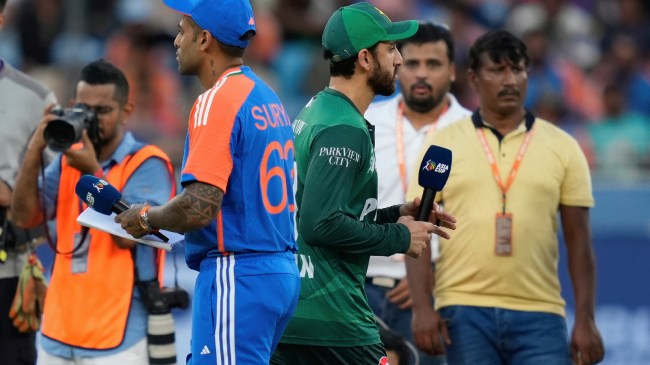Opinion I believed in cricket diplomacy between India and Pakistan. Not anymore
The Asia Cup match between the two neighbours wasn't rivalry — it was revanchism. Why play sport, if the players cannot be its best servants?
 The troubled politics between the two nations has almost always cast its shadow on cricket. (File Photo)
The troubled politics between the two nations has almost always cast its shadow on cricket. (File Photo) I used to be among those who believed India-Pakistan cricket must go on despite the acrimony in bilateral relations. I saluted the power of sport to create goodwill and become a bridge between nations at odds when athletes of the two Koreas walked hand in hand at the 2018 Winter Olympics. The tennis partnership between Rohan Bopanna and Aisam-ul-Haq Querishi, the “Indo-Pak Express” of tennis, was an example of sport blurring boundaries. The respect that Neeraj Chopra and Arshad Nadeem have for each other is a testament to comradeship in athletics. I am still not on the same page as George Orwell on the “Sporting Spirit” and cannot bring myself to argue that “Sport is an unfailing cause of ill will”. But after last week’s handshake episode in the India-Pakistan Asia Cup match, and the shadow it cast on their Super 4-level contest of the tournament on Sunday, I have become a naysayer on cricketing ties between the two nations. Why play sport, if the players cannot be its best servants?
Of course, the troubled politics between the two nations have almost always cast its shadow on cricket. Historian Ramachandra Guha has written of the Bengaluru crowd booing Javed Miandad in his last match during India’s famous win at the 1996 World Cup quarter finals. Yet, the abiding memories of that match were not spectator behaviour, but Ajay Jadeja taking down Waqar Younis, Venkatesh Prasad castling Amir Sohail and the Indian spinners choking the Pakistani top order after a rollicking start by Sohail and Saeed Anwar.
Javed Miandad’s last-ball six in Sharjah, Sunil Gavaskar’s back-to-the-wall battle, in vain, against the Pakistan spin attack in his last Test match, Sachin Tendulkar’s upper cut of Shoaib Akhtar at Centurion in 2003, S Sreesanth pouching a Misbah-ul-Haq scoop to give India victory at the inaugural T20 World Cup, Kumble’s 10 wickets in Delhi, Shaheen Shah Afridi bamboozling the Indian batting line-up with his raw pace at the T20 World Cup in 2021 and Virat Kohli’s refusal to give up when 28 runs were required in eight balls at Melbourne in 2022, were great advertisements for the game. While jingoism often led to bad blood among viewers, players of both sides showed healthy respect for each other. In recent years, the image of Babar Azam engaged in a discussion with his idol Virat Kohli after a hard-fought game kept alive the hope that sport could paper over geopolitical fault lines.
The effect of last week’s match was sobering on many like me who believe in that great axiom: Whoever dominates the field of play, the game is always the winner. The match will not be remembered for Abhishek Sharma dancing down the pitch first ball to belt Shaheen Shah Afridi down the ground, or Kuldeep Yadav’s leg breaks and googlies, or Jasprit Bumrah’s yorkers. As the Indian captain put it, “I feel a few things, few things in life are ahead of sportsmen’s spirit also.”
Surya Kumar Yadav has, at most times, given the impression of being mild-mannered, both on and off the field. He has said that his team keeps itself insulated from the social-media noise. But cricket is not played in a vacuum. It never was. Today, players are expected to become soldiers with guns on the field. That zeitgeist may not still be antithetical to the game as long as it has a bearing on how players bat, bowl and field, as long as it pushes them out of their comfort zones — perhaps enriching the sport in the process. Yadav has said that his teammates were out to make a statement on the field. The Indian captain’s tribute to the soldiers and victims of the ghastly terror attack in Pahalgam, after last week’s match, seemed to be in that vein.
But the handshake episode was not just about Indian cricketers wearing nationalism on their sleeves. Greeting an opponent after a match speaks for something inherent to the athlete’s credo — respect for the competitor. Sport teaches grace in victory and acceptance in defeat. It encourages opponents to appreciate each other’s work. If Yadav and his men were magnificent in showing the Pakistan team its place on the field of play at the group level, they were clinical with their demolition job at the Super Four stage. But the Indian cricketers may not realise this — in humiliating their opponents after the match, they have been revanchist towards the game itself. And the Pakistani team too hasn’t done well — their demand to sack match referee, Andy Pycroft, was churlish and showed them as bad losers.
Perhaps, there are times — as the Indian captain said last week — when sporting fundamentals must take a backseat. We cannot say what the BCCI wants by insisting on continuing to play Pakistan in multi-team tournaments. We do not know its motives. But if the players’ behaviour in the two matches is anything to go by, it’s apparent that the world’s richest board doesn’t care if the game itself is hurt in the ham-handed pursuit of its interests. In the last match, Pakistani pace bowler Haris Rauf pointed to the Indian section of the crowd and made a provocative gesture mimicking a plane crash. And the Abhishek Sharma-Rauf altercation on Sunday was not a usual heat-of-the-moment exchange of words – signs of bad blood between the teams are palpable.
Cricket deserves better. What has happened at the Asia Cup has forced many of us who love the sport to change our views – in the current circumstances, it would be hurtful for cricket to continue India-Pakistan cricketing ties.
kaushik.dasgupta@expressindia.com



